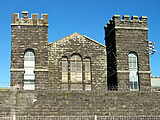What happened that day?
See historic events for any day of the year by entering the date below. Why not try your birthday?
Kiwi of the Week
Today in History

1955 20-year old hanged for murder
On the evening of 28 April 1955 a cold and hungry Edward Te Whiu broke into the house of Florence Smith, a 75-year-old widow, with the intention of robbing her. Smith was in bed when she heard him and turned on the light. He attacked her, fracturing her skull, breaking her jaw and her nose, knocking out her denture and breaking the hyoid bone in her throat. The pathologist concluded that she died rapidly from asphyxiation.
In a long statement to the police after his arrest on 12 May, Te Whiu admitted killing Smith. He explained that he knew she was dead when he left the property and had covered her up before washing the blood off his hands and making himself something to eat. He said he hadn’t meant to kill her, stating, ‘I only intended to knock her unconscious so that I could look the place over. I must have hit her once too often’. The defence took a similar line at his trial, which began on 25 July 1955 and lasted three days. But it took the jury just 35 minutes to convict him of murder. They gave no recommendation for mercy and he was sentenced to death.
Many questioned whether the death penalty was appropriate for Te Whiu because of his underprivileged background and childlike mental state. But his execution went ahead at Mount Eden prison at 6.59 p.m. on 18 August 1955. A justice of the peace, several reporters, a priest, doctor and selected police and prison staff bore witness. He was one of the last four people to be executed in New Zealand. The last was Walter Bolton on 18 February 1957.
- Further information: Sherwood Young, Guilty on the gallows, Grantham House Publishing, Wellington, 1998.
Internal links
External links

1971 Deadline for Vietnam pull-out announced
Prime Minister Keith Holyoake announced to Parliament the decision to withdraw New Zealand's combat force before the end of the year. This coincided with a similar announcement by the Australian government.
- Read more about New Zealand's involvement in the Vietnam War.
Image: NZ 161 Battery firing














